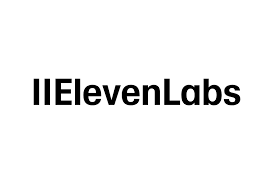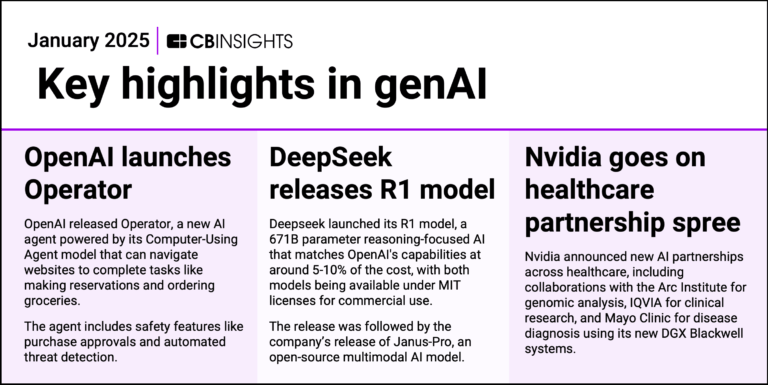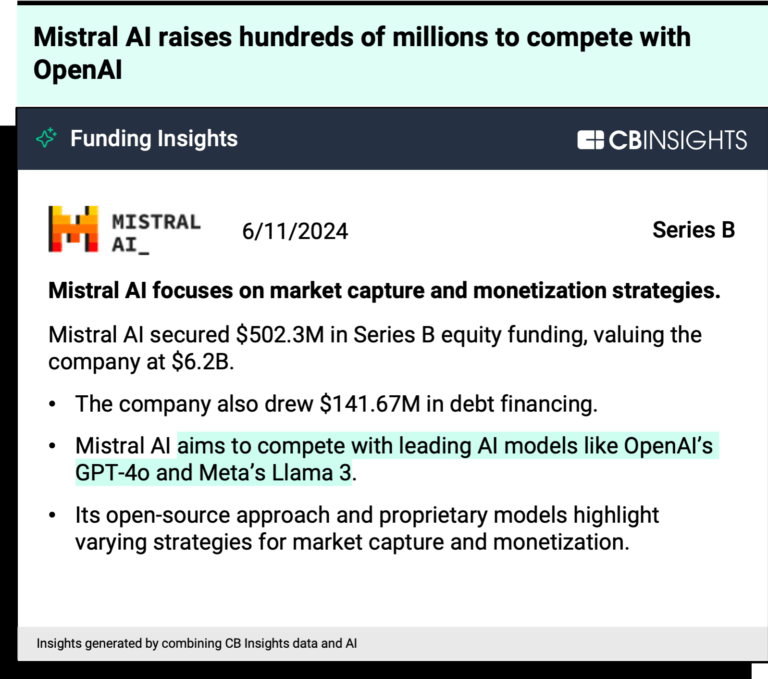
ElevenLabs
Founded Year
2022Stage
Series C - II | AliveTotal Raised
$282.35MLast Raised
$1.35M | 2 mos agoRevenue
$0000Mosaic Score The Mosaic Score is an algorithm that measures the overall financial health and market potential of private companies.
+16 points in the past 30 days
About ElevenLabs
ElevenLabs provides artificial intelligence (AI) audio technology, focusing on text-to-speech and AI voice generation across sectors. It offers tools for the creation of speech and sound effects for applications, including audiobooks and video voiceovers. It serves industries such as media and entertainment, publishing, and sectors requiring audio content creation and localization. It was founded in 2022 and is based in New York, New York.
Loading...
ESPs containing ElevenLabs
The ESP matrix leverages data and analyst insight to identify and rank leading companies in a given technology landscape.
The voice AI development platforms market provides tools, APIs, and infrastructure for building, testing, and deploying realistic conversational voice applications. These platforms enable developers to create human-like voice interactions with features such as real-time conversation, interruption handling, and low-latency processing. The market includes speech synthesis capabilities, voice recogni…
ElevenLabs named as Leader among 15 other companies, including SoundHound, Cartesia, and Deepgram.
ElevenLabs's Products & Differentiators
AI Dubbing + Studio
automatically dub videos across 29 languages while preserving the original voices in translation. Edit transcripts, translations and time codes.
Loading...
Research containing ElevenLabs
Get data-driven expert analysis from the CB Insights Intelligence Unit.
CB Insights Intelligence Analysts have mentioned ElevenLabs in 2 CB Insights research briefs, most recently on Feb 6, 2025.
Expert Collections containing ElevenLabs
Expert Collections are analyst-curated lists that highlight the companies you need to know in the most important technology spaces.
ElevenLabs is included in 8 Expert Collections, including Unicorns- Billion Dollar Startups.
Unicorns- Billion Dollar Startups
1,270 items
Digital Content & Synthetic Media
2,287 items
The Synthetic Media collection includes companies that use artificial intelligence to generate, edit, or enable digital content under all forms, including images, videos, audio, and text, among others.
AI 100
100 items
Generative AI 50
50 items
CB Insights' list of the 50 most promising private generative AI companies across the globe.
Generative AI
1,299 items
Companies working on generative AI applications and infrastructure.
AI 100 (2024)
100 items
Latest ElevenLabs News
Mar 31, 2025
Geeky Gadgets 12:47 pm The audio processing industry is witnessing a dynamic shift as leading players like OpenAI, ElevenLabs, and DeepGram compete to establish dominance. This competition is driving a concerted effort to reduce costs for text-to-speech (TTS), speech-to-text (STT), and conversational AI services. These advancements are not only reshaping the audio token costs and economics of audio processing but also paving the way for broader adoption of these technologies across industries. By examining pricing strategies, technological innovations, and market trends, Trelis Research helps you better understand the forces shaping the future of audio tokenization. TL;DR Key Takeaways : Audio tokenization is computationally expensive due to the high density of tokens required for processing audio data compared to text, driving up operational costs for TTS, STT, and conversational AI services. OpenAI, ElevenLabs, and DeepGram have distinct pricing strategies: OpenAI Whisper offers premium STT services, ElevenLabs focuses on high-quality TTS at a higher cost, and DeepGram provides more affordable STT solutions. Open source models like Fireworks and MOSI are disrupting the market by offering comparable performance at lower costs, creating downward pressure on proprietary pricing structures. Multimodal models, such as OpenAI’s GPT-4, are emerging as a potential solution to integrate audio, text, and visual data, but achieving real-time performance at lower costs remains a challenge. While TTS and STT costs are expected to decline due to advancements in efficient models, conversational AI will likely remain a premium service due to the complexity of real-time reasoning and natural language understanding requirements. Audio tokenization involves converting audio data into machine-readable tokens, allowing AI models to process and analyze sound. This process is far more resource-intensive than text processing due to the sheer volume of data involved. While a single sentence in text may require only a handful of tokens, processing one second of high-quality audio can demand hundreds of tokens. This disparity underscores the higher computational requirements and operational costs associated with audio models. High-quality audio models, such as OpenAI’s Whisper, rely on advanced token generation techniques and significant computational power. These requirements contribute to the elevated costs of audio services, particularly in real-time applications like conversational AI. However, recent advancements in smaller, more efficient models are beginning to challenge these cost structures. These innovations offer the potential for more affordable solutions without compromising performance, signaling a shift in the industry’s approach to cost management. How Do OpenAI, ElevenLabs, and DeepGram Compare on Pricing? The pricing strategies of OpenAI, ElevenLabs, and DeepGram reflect their unique market positions and priorities. Each provider has tailored its offerings to balance performance, quality, and cost, catering to different user needs. OpenAI Whisper: OpenAI’s Whisper is known for its robust STT capabilities, offering competitive rates for premium services. While its pricing is higher than some open source alternatives, it reflects the proprietary nature and high performance of its models. ElevenLabs: ElevenLabs stands out for its natural-sounding TTS solutions, which prioritize audio quality. However, this focus on quality comes at a premium, making it the most expensive option among the three providers. DeepGram: DeepGram appeals to cost-conscious businesses with its affordable STT solutions. While its pricing is competitive, the company may need to further adjust its rates as the market continues to evolve. In addition to these providers, open source models like Fireworks and MOSI are gaining traction. These alternatives offer comparable performance at a fraction of the cost, exerting downward pressure on pricing across the industry. As open source solutions become more sophisticated, they are likely to play an increasingly significant role in shaping the competitive landscape. OpenAI vs ElevenLabs vs DeepGram Audio Token Costs Compared Market Trends Driving Pricing Pressure Several key trends are driving the push to lower audio tokenization costs. One of the most significant is the rise of open source audio models. Models such as Orus and CSM 1B demonstrate that smaller, more efficient architectures can deliver high-quality results without the steep computational demands of larger models. This shift toward efficiency is expected to accelerate as developers prioritize scalability and cost-effectiveness. Another important development is the emergence of multimodal models that integrate audio, text, and visual data. OpenAI’s GPT-4, for example, highlights the potential of unified models to streamline processing and reduce costs. However, these models face challenges in achieving real-time reasoning while maintaining affordability. As the industry continues to innovate, balancing these competing demands will be critical to the success of multimodal solutions. What Do Current Pricing Structures Mean for Businesses? The pricing strategies employed by TTS and STT providers reveal significant profit margins, particularly for premium services. For example, ElevenLabs charges a premium for its high-quality TTS offerings, while OpenAI’s audio services are priced higher than their text-only counterparts. These pricing discrepancies highlight opportunities for optimization and cost reduction, particularly as competition intensifies. For businesses, especially startups and smaller enterprises, the high costs of audio services can pose a barrier to adoption. However, as more efficient models become available and providers adjust their pricing strategies, these technologies are likely to become more accessible. This shift could enable a wider range of industries to use audio processing capabilities, driving innovation and growth across sectors. Challenges in Reducing Costs for Conversational AI Conversational AI represents one of the most complex and resource-intensive applications of audio processing. These systems require large, sophisticated models capable of real-time reasoning and natural language understanding. As a result, the costs associated with conversational AI are unlikely to decrease as rapidly as those for TTS and STT services. OpenAI’s multimodal models, which integrate audio with other data types, may offer a competitive advantage in this space. By balancing advanced reasoning capabilities with real-time performance, these models could help address some of the cost challenges associated with conversational AI. However, achieving significant cost reductions will require continued innovation in model efficiency and computational optimization. What Lies Ahead for Audio Tokenization Costs? The future of audio token cost is poised for significant transformation. As smaller, more efficient models gain traction, the costs of TTS and STT services are expected to decline substantially. Open source initiatives will play a pivotal role in this shift, providing affordable alternatives to proprietary models and fostering greater competition in the market. Conversational AI, however, is likely to remain a premium service due to the complexity of the models involved. Providers will need to innovate continuously to balance performance with affordability, making sure these technologies remain accessible to a diverse range of users. As the industry evolves, the interplay between proprietary and open source solutions will shape the trajectory of audio processing costs, offering new opportunities for businesses and developers alike.
ElevenLabs Frequently Asked Questions (FAQ)
When was ElevenLabs founded?
ElevenLabs was founded in 2022.
Where is ElevenLabs's headquarters?
ElevenLabs's headquarters is located at 169 Madison Avenue, New York.
What is ElevenLabs's latest funding round?
ElevenLabs's latest funding round is Series C - II.
How much did ElevenLabs raise?
ElevenLabs raised a total of $282.35M.
Who are the investors of ElevenLabs?
Investors of ElevenLabs include Flat Capital, Andreessen Horowitz, SV Angel, BroadLight Capital, Smash Capital and 21 more.
Who are ElevenLabs's competitors?
Competitors of ElevenLabs include OpenAI and 5 more.
What products does ElevenLabs offer?
ElevenLabs's products include AI Dubbing + Studio and 4 more.
Loading...
Compare ElevenLabs to Competitors

Voicemod specializes in voice-changing technology, operating in the audio tools industry. The company offers a voice changer and soundboard that allows users to modify their voice and add custom sound effects, suitable for use in games, communication desktop apps, and streaming platforms. Its primary customer base includes gamers, content creators, and virtual tubers. It was founded in 2014 and is based in Valencia, Spain.

Respeecher specializes in artificial intelligence voice cloning technology within the creative and business sectors. The company offers services such as speech-to-speech and text-to-speech conversions, enabling the creation of authentic AI voices for various applications. It caters to industries such as film and television production, animation, game development, and customer support, providing voice solutions that enhance projects and services. The company was founded in 2018 and is based in Burbank, California.

Resemble AI specializes in generative AI voice technologies and deepfake audio detection within the artificial intelligence sector. The company offers products that enable the creation of synthetic voices through text-to-speech and speech-to-speech synthesis, as well as tools for detecting and watermarking deepfake audio content. Resemble AI's solutions cater to various industries, including entertainment, gaming, customer service, and security. It was founded in 2019 and is based in Mountain View, California.
Adauris is a company that specializes in transforming written content into audio, operating within the media and technology sectors. The company offers a platform that automates the conversion of text into audio, complete with customizable audio players and various voice options in multiple languages. Adauris primarily serves editorial publications, content marketers, and enterprises seeking to add audio capabilities. It was founded in 2020 and is based in Vancouver, British Columbia.

Murf AI develops voice technology that uses artificial intelligence to create voiceovers for various media. The company provides products including text-to-speech, voice cloning, AI dubbing, and AI translation, aimed at improving content accessibility and engagement. Murf AI's solutions serve multiple sectors, offering tools for e-learning, advertising, audiobooks, and others. It was founded in 2020 and is based in Salt Lake City, Utah.

LionRocket specializes in deep learning and anomaly detection within the technology sector. The company offers artificial intelligence (AI) solutions that focus on synthetic dataset generation and learning improvements and include functionalities for fake news detection and noise reduction in datasets. LionRocket's primary clientele includes educational institutions and research organizations that utilize AI for academic and data integrity applications. It was founded in 2019 and is based in Seoul, South Korea.
Loading...


